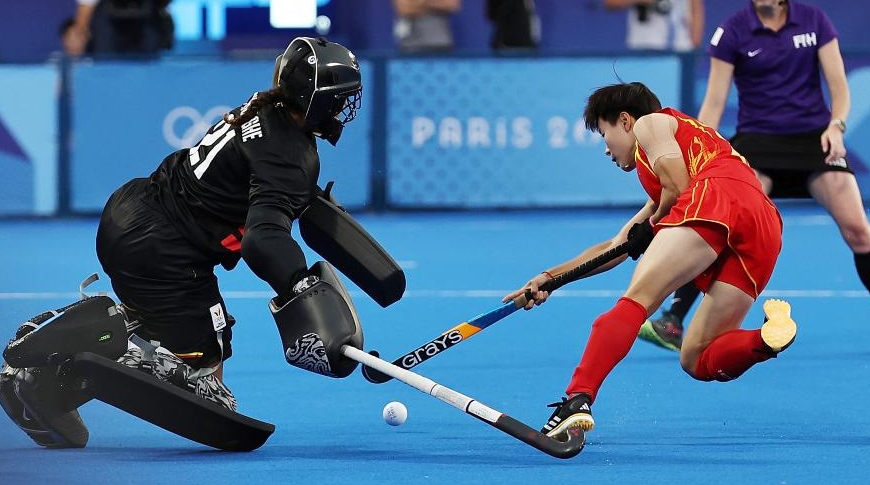After leading China to a silver medal at the 2024 Paris Olympics, women's hockey head coach Alyson Annan believes the top of the podium is now within reach.
"Not very far, if we work hard," Annan told Xinhua during the 15th National Games.
The Australian, who won two Olympic gold medals as a player and coached the Netherlands to Olympic gold, said China's gap to the world's best is small and surmountable.

Head coach Alyson Regina Annan (R) of China hugs team player Chen Yang in celebration of victory in the women's hockey semi-final match between China and Belgium at the Paris 2024 Olympic Games in Colombes, France, Aug. 7, 2024. (Xinhua/Ren Pengfei)
Under her guidance, China won gold at the 2022 Asian Games and silver in Paris, losing to the Netherlands in a penalty shootout. That narrow defeat only strengthened her conviction that her side can go one better.
"We're working a lot on the speed of play, playing faster and smarter," Annan said.
At the National Games in Yunfu, Guangdong Province, Annan has been scouting the next generation of talent, coding performances against strict selection criteria on her laptop.
"We designed the system particularly for this tournament. It gives us a good database of areas to develop," said the 52-year-old.
She described the level of competition as exceptional. "I think that we have at least 70 names on our list of potential players for the future. And for now, I think that's extraordinary in any country. I did not have that when I was coaching the Netherlands. It's been phenomenal."
Annan said she found the women's matches "a little bit more exciting" than the men's and praised the presence of young players. "In the Netherlands, you don't see a 16-year-old playing in the national competition, but here it's exciting."
Her coaching philosophy centers on giving players autonomy. "I like to put a lot of the responsibility back onto the team," she said.
She often motivates her players in Mandarin with phrases like "Jiayou!" ("Let's go!"), "Baifenbai chuanqiu" ("100% pass"), and "Kanqiu, chuanqiu" ("see the ball, pass the ball").
Annan has increased the team's exposure to top-level opponents by scheduling about 50 international matches a year, mainly in Europe. "Before I came, they rarely went to Europe, nor played against a lot of teams. And now we play about 50 games a year, which is a lot. That's necessary and important for our growth and development."
She also noted the cultural difference between the Chinese and Dutch systems. "The Chinese players need to develop other areas, to develop the mind. That's a good thing for sport," she said. "Rest is also an important factor. That's the balance that the team need to find."
China's next challenge will be the FIH Pro League matches in February 2026 in Yunfu, where they will face the Netherlands and England.
Off the pitch, Annan said she feels at home in China, drawn to the country's culture and sense of safety. The bracelets she wears on her wrist, some bought and others gifted, symbolize that bond.
"I really like them. I like to have something in my hands, and now I have them. When they're getting darker, they look better. As Chinese use them, I use them the same," she said.


 Share:
Share: 




 京公網安備 11010802027341號
京公網安備 11010802027341號